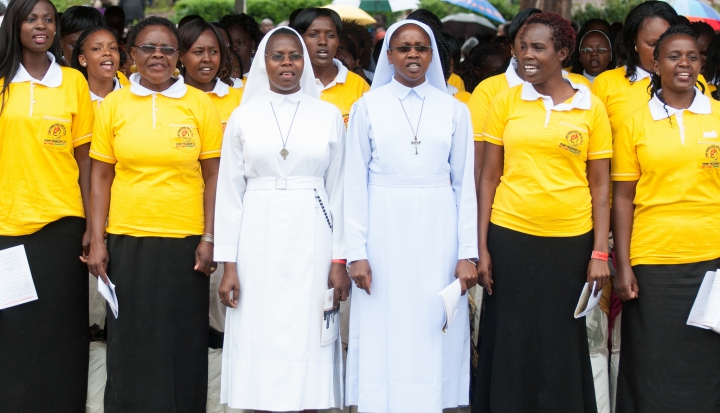Since the beginning of his pontificate, Pope Francis has implored the church to turn to the peripheries. Rarely have words been put into such direct action as they were when the pope personally visited a geopolitical and ecclesial periphery during his November 2015 visit to Africa.
In one amazing moment during his five-day tour of East and Central Africa, Pope Francis began a year of mercy, not by opening an ornate, golden door at a basilica in Rome, but by leaning in with both hands to push open the humble wooden doors of the cathedral in Bangui, the capital city of the Central African Republic. It is hard to overestimate the powerful symbolism of the bishop of Rome coming to this most forgotten spot on the globe to declare the beginning of a Jubilee for the world’s 1.25 billion Catholics and all people of good will. He told the people waiting outside the doors of the cathedral that day that their city was “the spiritual capital of the world.”
Few nations have as large a claim on the unfortunate status of “periphery” as does the Central African Republic. Social indicators place it among the least developed countries in the world—ranked 180 out of 187 on the United Nations’ Human Development Index, despite (and perhaps because of) its great mineral wealth. The Central African Republic is wracked by internal strife partly fueled by competition for its resources, a conflict described by the United Nations as the world’s most neglected humanitarian crisis. Out of a nation of only 4.5 million, more than a million of its people have been displaced by violence between warring militias—one, the Seleka, comprised mainly of Muslims, and the other, the Anti-balaka, formed by Christians and traditionalist communities in defense against Seleka outrages in 2013. Now they rampage themselves following their own anarchic logic, targeting Muslims, but also preying on members of their own communities.
Pope Francis made perhaps the most dangerous visit of any modern pontificate by landing in the airport at Bangui. The ISIS-sponsored attacks on Paris had raised global security concerns, and in Bangui itself, in the weeks leading up to the pope’s arrival, violence claimed more lives almost each night. Urged to cancel the visit altogether, Pope Francis instead insisted on following his original itinerary, one that included a visit to Bangui’s central mosque, located in the PK5 neighborhood, the epicenter of the city’s intercommunal violence.
There, Pope Francis brought his message of reconciliation and hope, one meant certainly for the people of Central Africa, and also for a wider world, grappling with the continuing clash between the Western and Islamic worlds. “God is peace, ‘salaam,’ ” the pope said, as armed U.N. peacekeepers monitored the crowd. “Christians and Muslims are brothers and sisters,” created by the same God. They must act like it, he said.
“Together, we must say no to hatred, to revenge and to violence, particularly that violence which is perpetrated in the name of a religion or of God himself,” the pope said.
In the past the church has proposed “authentic development” in economically marginal nations, resisting the exploitation of people and resources and promoting the full growth of the individual person within each state. Now Pope Francis proposes an “integral development” with a heightened attention to preserving the dignity of the human person and the future we all share. But the church has also learned that its outreach to the “periphery”—to nations in Africa and other states within the so-called developing world—is not a one-way transaction but a reciprocal exchange, built on listening and relationship.
It is here among people who are living with the natural outcomes of policies made in distant capitals that wisdom unheard in the distracted consumer culture of the West can be located. We go with this traveling pope to the peripheries not just to give but to receive. There, among the outliers of society, class, power, and geography, Pope Francis believes not only will the church find its mission, it may perhaps find itself.
This article appears in the February 2016 issue of U.S. Catholic (Vol. 81, No. 2, page 42).
Image: Flickr cc via CAFOD Photo Library














Add comment